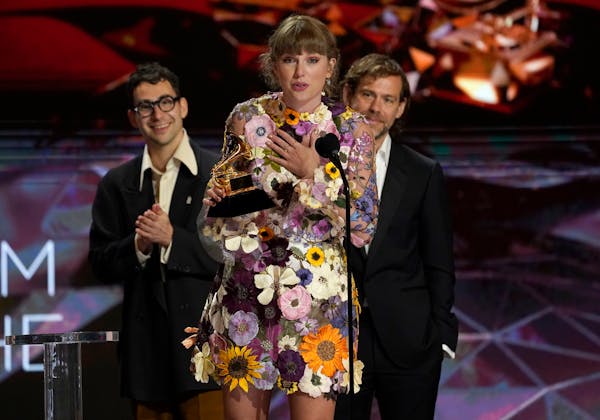Should we care that a high-profile national reporting job covering Taylor Swift went to — gasp — a man?
It shocked me when USA Today/The Tennessean and their parent company, Gannett, announced last week that its first-ever Swift beat would be filled by a 35-year-old journalist named Bryan West.
The summer of 2023, after all, was the season of girl power, not only of the Eras Tour and friendship bracelets, but of "Barbie" and Beyoncé and "The Summer I Turned Pretty." It was about kindness, cowgirl boots and the color pink. It was about grown women giving themselves license to celebrate girlhood. It was also about women reaching the pinnacles of power and success, even in the face of an assault on our rights in this country.
By any measure, Swift is a cultural and feminist icon. Countless girls and young women have felt validated by her songs, which unabashedly speak from the female perspective. Swift and womanhood are explicitly linked, said my much younger Star Tribune colleague, Zoë Jackson, a Swift fan feeling the sting of Gannett's hiring decision.
"Women have been mocked for liking Taylor for a decade," Jackson told me. "Society has underestimated the social and buying and cultural power that she and her fans have, and a woman should report on that influence."
To put it bluntly, Swift's cultural importance has been overlooked because her audience is largely girls and women, but it's a man who'll get to make a living writing about it.
The job description went viral after Gannett posted the opening in September. Journalists pilloried the new beat, noting mass layoffs across the industry were leaving entire communities without an investigative or city hall reporter.
While it's unclear how many people applied for West's job and what percentage were female, the Wall Street Journal reported that within two weeks of the posting, Gannett received about 1,000 applicants for the Swift gig as well as for a new Beyoncé reporter. The Tennessean's editor told Variety that the pool of Swift applicants ran the gamut from fan influencers to hard-news journalists, "including at least one very established White House reporter."
To be fair, no job candidate would ever satisfy journalists and Swift's fan base, two camps that have united on their displeasure with West's hiring.
But having seen his video application, which he posted to YouTube last week, I can understand West's appeal among news managers. Professionally speaking, he is quite qualified, having snagged the highest awards in broadcast journalism (the duPont is the equivalent of a Pulitzer). He displays a gift for gab and video savvy that can be harnessed for TikTok. He's passionate and likable. He has reams of story ideas that will not only produce articles and page views but social media content that will garner clicks, likes and shares.
While West may not be the target audience for Swift's music, he's no doubt personally affected by it. He told the Tennessean that he grew more attached to Swift's music while recovering from struggles related to depression and alcohol addiction.
"The past five years have taught me so many valuable lessons, like always clean your side of the street — which is a Taylor lyric, but it's from the sober community," West said. "I learned to take things one day at a time."
Maybe that speaks to the universal pull of Swift's music. She knows what it's like to be alone and struggle, to be broken and betrayed, to lose friendships and innocence, to transition awkwardly from child to adult. Women don't have a monopoly on those overarching themes of what it is like to be human.
Perhaps most distressing to journalists who strive for objective reporting of their subjects, West is an unapologetic Swiftie. (While recounting the time he met the star backstage, "Our ears touched and I thought for a second, I could be straight," he said in his video.)
Poynter.org, a news site about the journalism industry, covered the news of West landing the gig and questioned his ability to report critically on Swift, but failed to address the fact West is male. The writer who filed that story immediately heard from readers criticizing him for the omission. The next day, Tom Jones issued a mea culpa. "I dropped the ball for failing to see that perhaps the biggest issue isn't that West is a fan of Swift, but that he's a man," Jones said.
The fact that we expect a reporter to share some kind of identity or lived experience with the subject they cover shows you how far journalism has evolved in less than a generation.
When I started out in this field decades ago, cub journalists from marginalized backgrounds had to prove we could report on our own communities without fear or favor. Now more newsroom leaders are recognizing that the backgrounds of women, people of color or LGBTQ journalists should be seen as assets, rather than liabilities that we need to hide or overcome.
Could a trust-fund kid from Manhattan authentically cover issues of classism and structural inequity as a full-time poverty reporter in Appalachia? Would a male journalist be well-attuned to the double standards applied to women, a bias that Swift describes in her song, "The Man"? Of course it's possible. It may just take more work.
Growing up, Jackson, 25, remembers hearing people deride the star's songwriting abilities because she wrote about her boyfriends — even though relationships have been reliable fodder for pop artists since time immemorial.
"I just hope [West] can capture that nuance," Jackson said. "As a reporter, if I'm writing about an identity I don't have, the people I'm talking to need to make up the bulk of that reporting. That's the vibe I'm hoping he will bring to the job."
Yuen: How success has pushed Minnesotans off sidelines in trans athlete debate

Yuen: When cancer struck a second time, she found 'euphoria'

Yuen: The University of Minnesota's first male dance team member is turning heads by staying real
Yuen: How George Floyd's aunt healed her heart and lent her voice for justice


